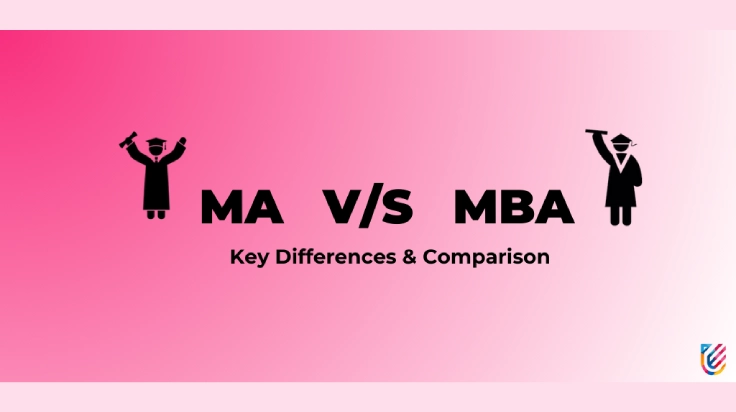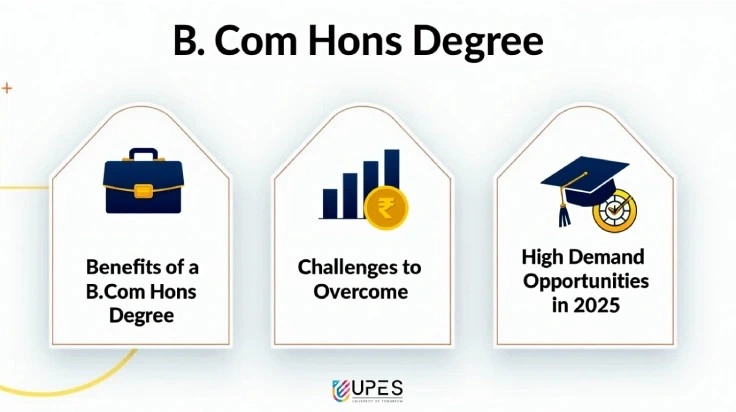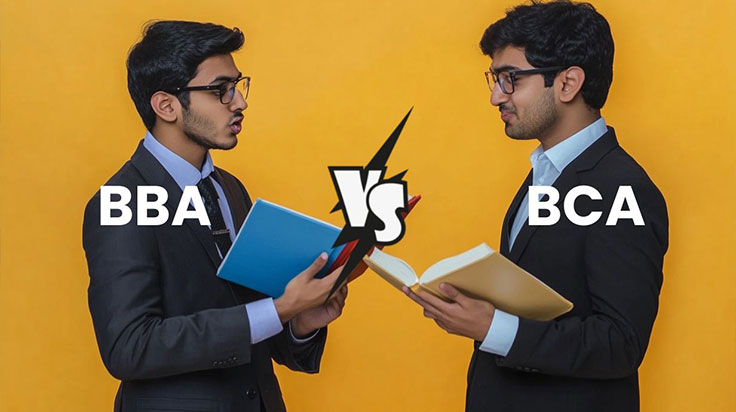BBA vs. B.Com: Which Degree Will Skyrocket Your Career?
- UPES Editorial Team
- Published 11/10/2024

Table of Contents
• Key Differences between BBA and B.Com
• Similarities Between BBA and B.Com
• Course Structure & Specializations
• Future Career Scope
• Prospects for Higher Studies
• Skills Acquired Through BBA and B.Com
• Salary Comparison
• Industries to Work In
• Which is better?
• Key Aspects to Consider before Choosing
Choosing between a Bachelor of Business Administration (BBA) and a Bachelor of Commerce (B.Com) can be challenging for students aiming to build a career in business or finance. Both courses offer valuable insights into commerce, management, and related fields, but they differ in structure, specialization, and career prospects.
This blog compares BBA and B.Com, helping you make an informed decision.
Key Differences between BBA and B.Com
Focus:
BBA focuses on management and administration, preparing students for leadership roles in the corporate world. B.Com, on the other hand, emphasizes accounting, finance, and taxation, offering a solid foundation in commerce.
Course Structure:
The BBA curriculum includes subjects like marketing, HR/human resources, entrepreneurship, and strategic management. B.Com, meanwhile, covers topics like economics, financial accounting, business law, and auditing.
Similarities Between BBA and B.Com
Commerce Foundation:
Both BBA and B.Com programs provide a foundational understanding of business, economics, and finance, equipping students with essential commercial knowledge.
Duration:
Both are undergraduate programs typically lasting three years.
Course Structure & Specializations:
1. BBA
BBA offers specializations like Marketing, Human Resource Management, Finance, Entrepreneurship, and International Business. This provides students with a broad understanding of management functions and the opportunity to pursue leadership roles.
2. B.Com
B.Com provides specializations in Accounting, Taxation, Auditing, Finance, and Economics. This makes it an ideal choice for students interested in pursuing careers in finance or accounting.
Future Career Scope
BBA Career Scope:
BBA graduates can work in marketing, human resources, finance, and business operations. Job roles include Business Analyst, Marketing Manager, HR Manager, and Operations Manager.
B.Com Career Scope:
B.Com graduates often enter the finance industry, taking up roles like Accountant, Financial Analyst, Auditor, or Tax Consultant. B.Com graduates are also well-suited for government roles and financial services.
Higher Studies for Better Pay
BBA Higher Studies:
Graduates can pursue an MBA (Master of Business Administration) to gain specialized management skills or explore postgraduate diplomas in management.
B.Com Higher Studies:
B.Com students can opt for higher studies like CA (Chartered Accountancy), CMA (Certified Management Accountant), or an M.Com (Master of Commerce), focusing more on finance and accounting.
What Skills Will You Acquire through BBA and B.Com?
BBA Skills:
Leadership, communication, strategic thinking, and decision-making are key skills developed during a BBA program.
B.Com Skills:
Analytical thinking, financial expertise, understanding of taxation laws, and attention to detail are developed in a B.Com program.
| Skill Category | BBA Students | BCom Students |
| Business Management |
|
|
| Marketing & Sales |
|
|
| Finance & Accounting |
|
|
| Entrepreneurship |
|
|
| Human Resource Management |
|
|
| Operations and Supply Chain |
|
|
| Communication |
|
|
| Leadership and Teamwork |
|
|
| Information Technology |
|
|
| Critical Thinking |
|
|
| Global Business |
|
|
Most Awaited Salary Comparison Between Them
BBA Salary:
The starting salary for BBA graduates can range from ₹3 to ₹6 lakhs per annum, depending on the industry and job role.
B.Com Salary:
B.Com graduates typically start with a salary between ₹2.5 to ₹4.5 lakhs per annum, but those pursuing CA or other certifications can command higher pay.
| Degree | Average Salary (per annum) | Job Roles for Freshers | Salary Influencing Factors |
| BBA (Bachelor of Business Administ.) | ₹3-5 LPA |
|
|
| BCom (Bachelor of Commerce) | ₹2.5-4.5 LPA |
|
|
Industries to Work In
Post BBA:
BBA is ideal for roles in management and operations. Graduates can work in sectors like:
1. FMCG
2. IT
3. Banking
4. E-commerce
5. ConsultingPost B.Com:
B.Com graduates are suited for industries like:
1. Banking
2. Financial Services
3. Auditing
4. Accounting
5. Government roles.
Final Question: Which Is Better?
There’s no definitive answer to whether BBA or B.Com is better—it depends on your career goals. If you’re interested in management, entrepreneurship, or marketing, BBA might be a better choice. However, if you prefer finance, taxation, or accounting, B.Com is a stronger option.
Key Aspects to Consider Before Choosing
Career Interests:
If you aim to become a manager, marketer, or business leader, BBA is more suitable. For a career in finance, accounting, or auditing, B.Com is preferable.
Higher Study Plans:
Students eyeing an MBA may benefit more from a BBA, while those interested in CA or CFA should choose B.Com.
Skill Development:
If leadership, decision-making, and strategic thinking are your interests, opt for BBA. B.Com will develop analytical and financial skills.
Conclusion
Both BBA and B.Com offer unique career paths and opportunities. The choice ultimately depends on your personal interests, strengths, and career goals. Carefully consider your aspirations, future study plans, and the industries you wish to work in before making your decision.
UPES Editorial Team
Written by the UPES Editorial Team
UPES Admission Enquiry
Subscribe to UPES Blogs
Join our community for exclusive stories, insights, and updates
By clicking the "Subscribe" button, I agree and accept the privacy policy of UPES.


















































